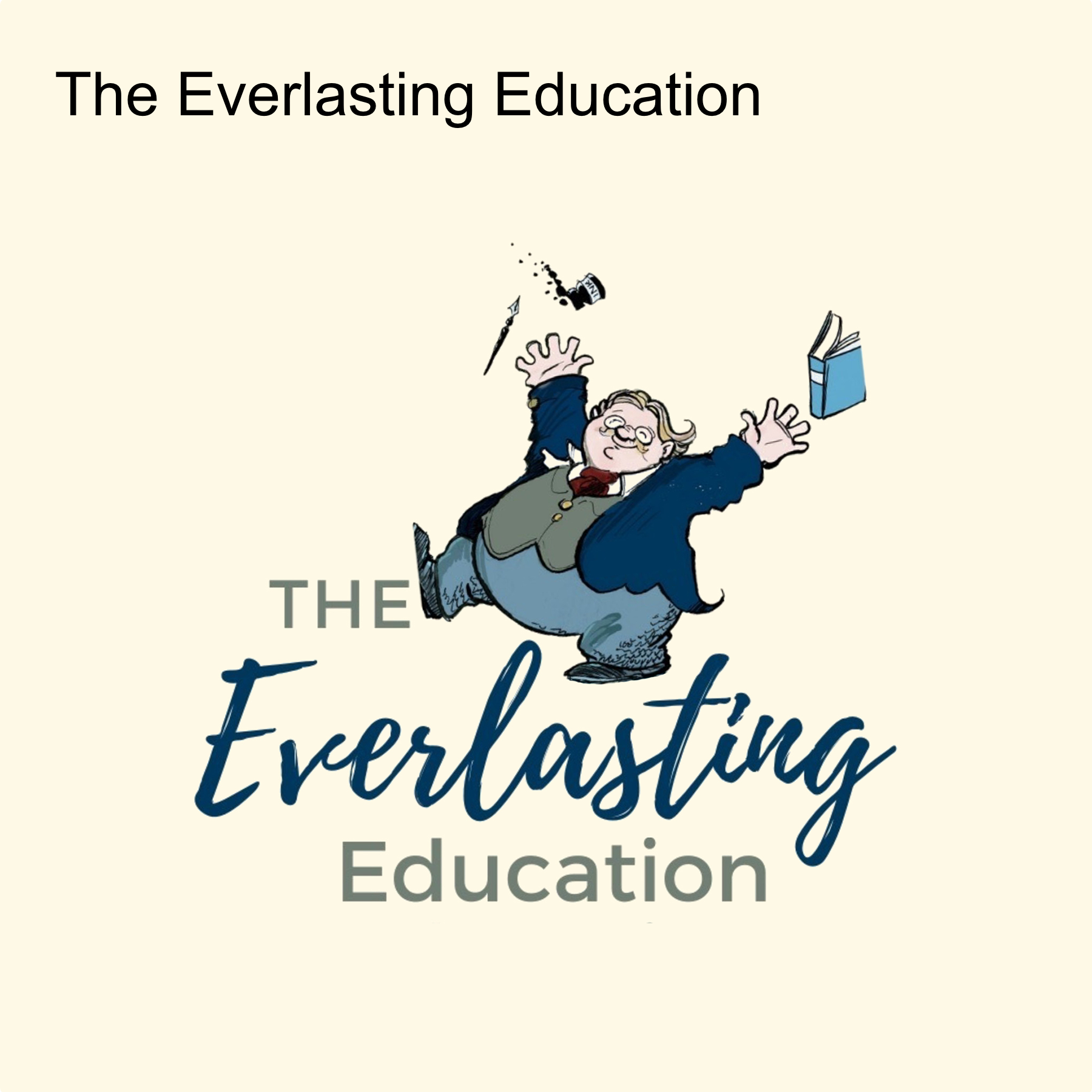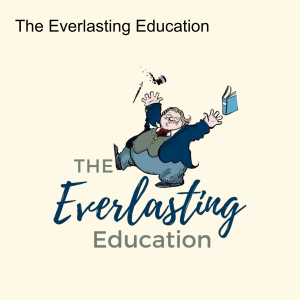
5.1K
Downloads
24
Episodes
G.K. Chesterton quipped, ”Without a gentle contempt for education no man‘s education is complete.” The Everlasting Education Podcast is a Kepler Education production in which we attempt to help families achieve the best of education through a gentle contempt for education.
Episodes

Monday Sep 12, 2022
Ep. 24 - Odin and Mercury 3: The Socratic Discussion
Monday Sep 12, 2022
Monday Sep 12, 2022
This is Episode 24 of The Everlasting Education Podcast, a Kepler Education Production.
In episode 24 of the Everlasting Education Podcast, Scott and Joffre discuss the Socratic dialogue in the classroom. Just like all good conversation, Socratic dialogue is an art—a skill that can be improved with practice. But Socratic dialogue, unlike casual conversation, has a particular aim—to discover the truth or meaning of something to the end that we might live wisely and flourish as human beings. Using elenchus, an investigative means of inquiry that is meant to discover fallacies in one’s argument or worldview—like peeling layers of an onion—teachers act as midwives, and help students give birth to truth.
Learn more at http://kepler.education

Wednesday Aug 31, 2022
Ep. 23 - Odin and Mercury: Classroom Conversations
Wednesday Aug 31, 2022
Wednesday Aug 31, 2022
This is Episode 23 of The Everlasting Education Podcast, a Kepler Education Production.
In episode 23 of the Everlasting Education Podcast, Scott and Joffre discuss the art of conversation in the classroom. Since conversation is an art, it is a skill that can be improved upon; and in this episode, our hosts unpack the ways in which students can develop the craft of conversation and successfully participate in Socratic dialogues in an online classroom.
Learn more at http://kepler.education

Friday Aug 12, 2022
Ep. 22 - Odin and Mercury
Friday Aug 12, 2022
Friday Aug 12, 2022
This is Episode 22 of The Everlasting Education Podcast, a Kepler Education Production.
In episode 22 of the Everlasting Education Podcast, Scott and Joffre take slightly different approach to St. Augustine's call to Christians to be "wise and eloquent" by introducing a new series on the noble art and science of rhetoric using instead, the mythological gods, Odin and Mercury, as models of language formation and influence. For example, the names of the days and months in the calendar are formed by each culture's view of the mythological gods' powers rather than their station in the pantheon.
Learn more at http://kepler.education

Wednesday Aug 03, 2022
Ep. 21 - Getting an Informal Classical Education by Carrying Books
Wednesday Aug 03, 2022
Wednesday Aug 03, 2022
This is Episode 21 of The Everlasting Education Podcast, a Kepler Education Production.
In this episode, Scott and Joffre talk about the importance of books and how we all can become classically educated by developing a habit of acquiring, carrying, and reading books. In a technological world filled with pixels, a love for reading books must be developed intentionally through wonder, curiosity, and the planned neglect of activities of lesser value.
Learn more at http://kepler.education

Thursday Jul 28, 2022
Ep. 20 - How to Talk About Classical Education
Thursday Jul 28, 2022
Thursday Jul 28, 2022
This is Episode 20 of The Everlasting Education Podcast, a Kepler Education Production.
Learn more at http://kepler.education

Thursday Jul 07, 2022
Ep. 19 - Education is Immeasurable but Observable
Thursday Jul 07, 2022
Thursday Jul 07, 2022
This is Episode 19 of The Everlasting Education Podcast, a Kepler Education Production.
In this episode, Scott and Joffre discuss the manner in which education, though immeasurable, is observable. On the one hand, attempting to measure education can lead to conflating "good grades" with "true education." On the other hand, failing to measure education in any capacity can lead to a false sense of educational achievement (i.e., to flourish as a human being). By recognizing the characteristics of an educated person, one can observe whether or not—or to what degree—a student is being educated.
Learn more at http://kepler.education

Tuesday Jun 28, 2022
Ep. 18 - Speaking Up, Speaking Out, and Speaking Well
Tuesday Jun 28, 2022
Tuesday Jun 28, 2022
This is Episode 18 of The Everlasting Education Podcast, a Kepler Education Production.
In this episode, Scott and Joffre read and discuss the virtues of speaking up, speaking out, and speaking well. While we all have seemingly legitimate reasons for sitting back, Christian young people—especially young men—should practice taking the opportunity to speak when it’s appropriate. This is a fundamental aspect of a human education, however uncomfortable it may seem to do so. St. Augustine duly noted that Christians need to be both wise and eloquent amidst a world without sound reason or properly ordered loves.

Thursday Jun 09, 2022
Ep. 17 - Sheep Among the Wolves
Thursday Jun 09, 2022
Thursday Jun 09, 2022
This is Episode 17 of The Everlasting Education Podcast, a Kepler Education Production.
In this episode, Scott and Joffre read and discuss Abraham Kuyper's treatise, Sheep Among the Wolves.
Abraham Kuyper was a leader in the movement for education reform in the Netherlands during the late 19th and early 20th centuries. A prolific intellectual, Kuyper also founded a political party (the Anti-Revolutionary Party), a denomination, and a university. Additionally, he led the movement to reform elementary schools, served as prime minister of the Netherlands from 1901-1905, and was a prolific writer. In addition to confessional studies, historical works, journalistic works, and political treatise, he also wrote more than 1300 devotional and theological treatises in his lifetime.
Sheep Among the Wolves is an example of Kuyper's views on Christian parents' responsibility to raise their children in the nurture and admonition of the Lord and not send them to schools where the values of the home are not represented. It is true that Jesus sent his disciples into the world as sheep among the wolves—but not until they had been raised to maturity. As Kuyper so eloquently asserts, parents who send their sheep among the wolves before they are actually ready are not only unwise but also demonstrate their own immaturity in Christ.

Thursday May 19, 2022
Ep. 16 - Summertime Leisure Opportunities
Thursday May 19, 2022
Thursday May 19, 2022
This is Episode 16 of The Everlasting Education Podcast, a Kepler Education Production.
Summertime is a well-deserved break for teachers and students; but that doesn't mean education stops—only formal education. It's okay to take a break, but instead of spending all of our free time merely amusing ourselves, summer is a great time to pursue those opportunities and interests the responsibilities of formal education doesn't allow for. In this episode of the Everlasting Education Podcast, Scott and Joffre discuss the benefits of informal education and share some ideas for spending our leisure time productively and enjoyably.

Friday May 13, 2022
Ep. 15 - The Promise of a Christian Paideia
Friday May 13, 2022
Friday May 13, 2022
This is Episode 15 of The Everlasting Education Podcast, a Kepler Education Production.
In this episode, Scott Postma and Joffre Swait discuss chapter 8 of Hicks Norms and Nobility, "The Promise of Christian Paideia." Hicks states, "The creative tension between pagan humanism and Christianity animates normative education and promises to lift the student to a level of understanding above reason in an experience of faith. Faith satisfies man's craving for a transcendent justification of the Ideal Type, at the same time as it makes possible on a universal scale the self-transcendence that the ancient philosophers sought only be esoteric means." In other words, Christianity does something for education that classical paideia could not do. Christianity is the answer to transcendence (i.e., both apprehending and approximating one's life in accordance with Truth, Goodness, Beauty) that so many of the philosophers sought but could not achieve through human reason. Instead, "the answer was provided in the person of Christ: the spirit of eros incarnate, the expressor of the divine will, and the truly divine object that self-transcending requires."
David V. Hicks's, Norms and Nobility was first published in 1981 when it won the American Library Association's Outstanding Book Award. Since that time, it has gone on to become one of the most influential books in the Classical Education movement. Hicks's "purpose in writing the book is to offer a personal interpretation of classical education—its ends, as well as some of its means—and to respond to the objections of those who might approve of the goals of such an education, but who believe that it cannot meet the needs of an industrial democracy ro that it is not feasible as a model for mass education."
